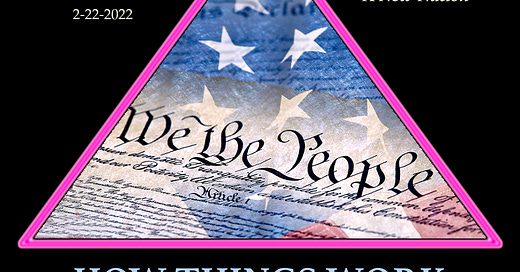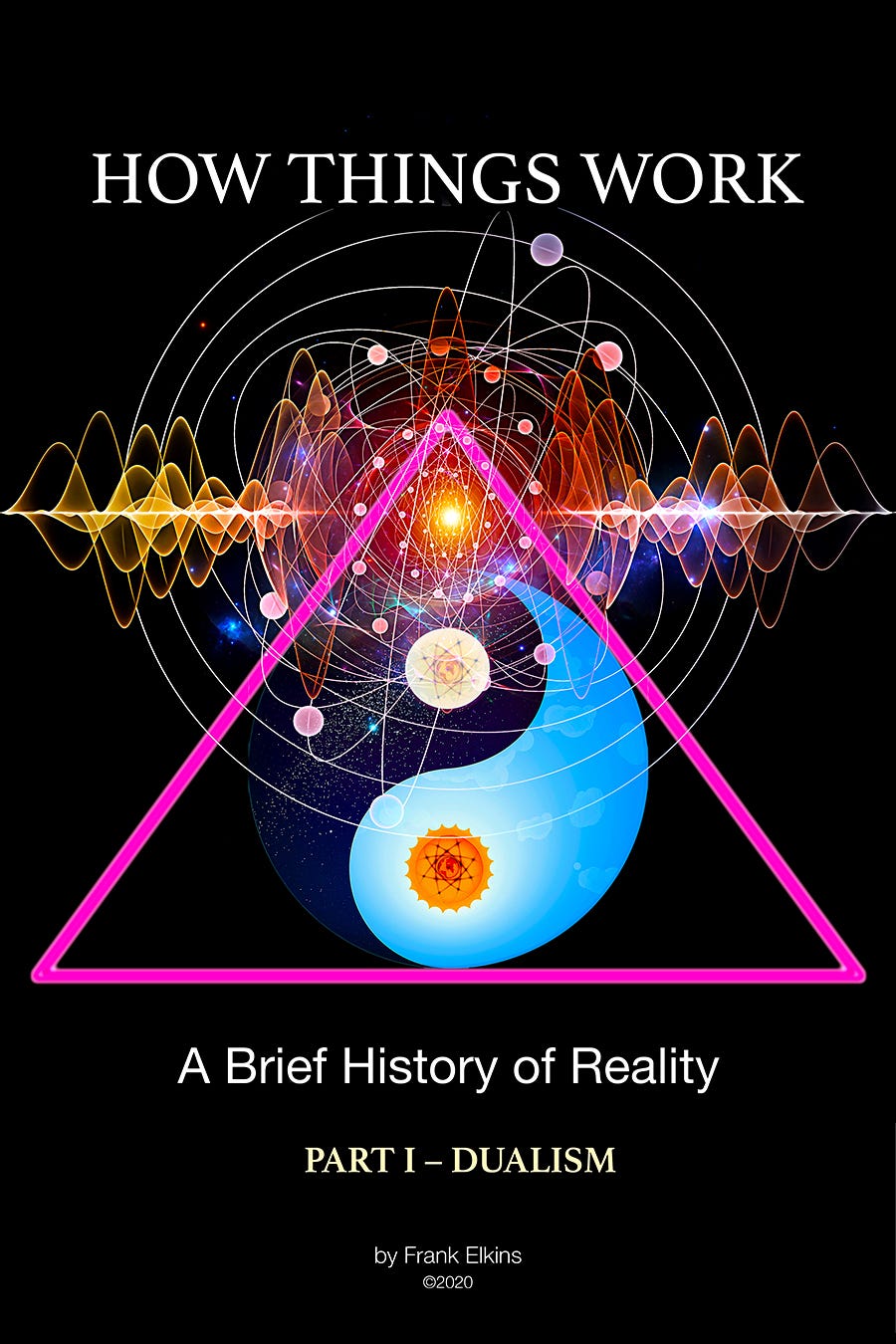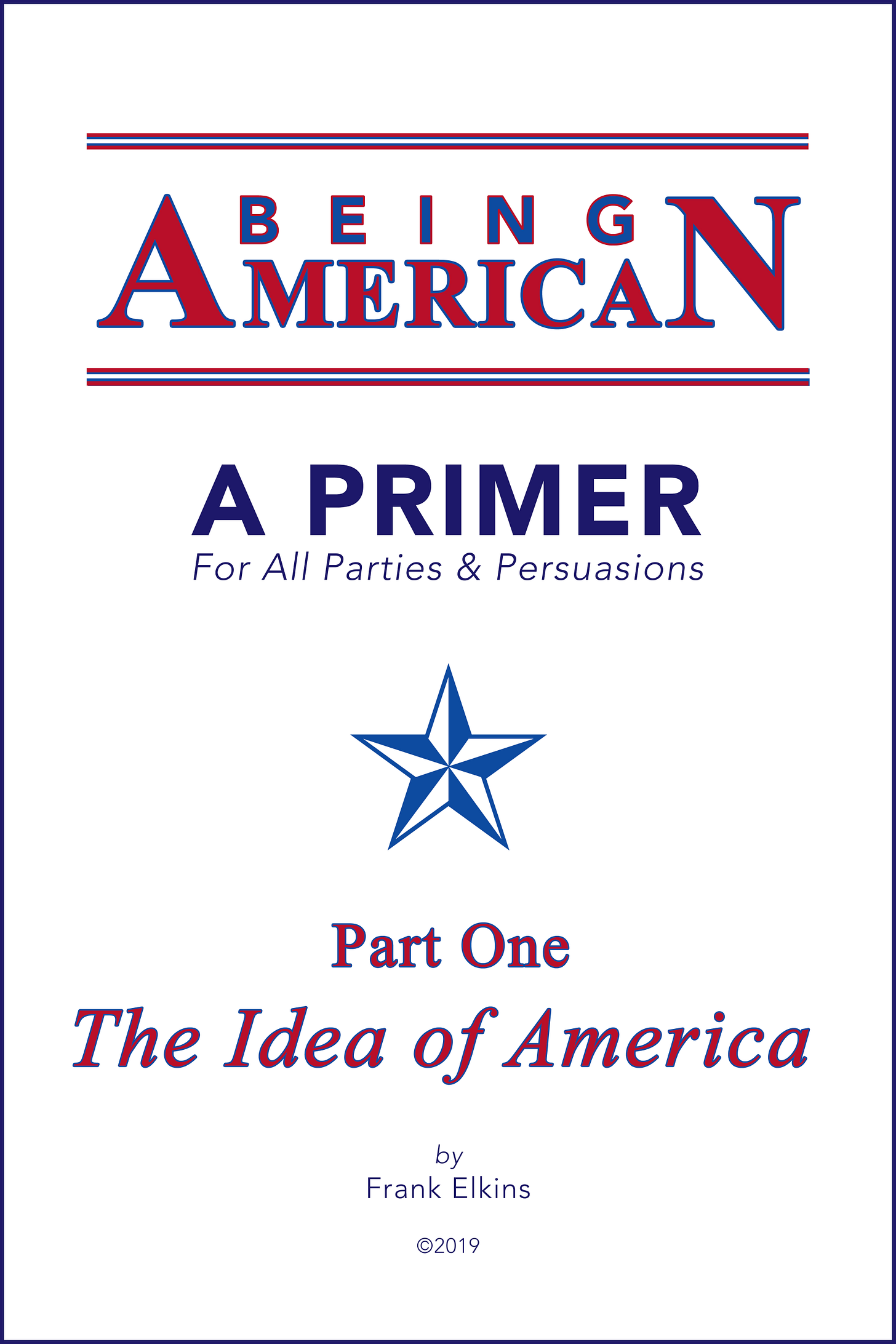How Things Work – A Brief History of Reality
Book I - Dualism (The Age of Reason)
Be A Part of the Conversation!
Tuesday, February 22, 2022
“What is 'real'? How do you define 'real'? If you’re talking about what you can feel, what you can smell, taste and see then 'real' is simply electrical signals interpreted by your brain.” – Morpheus (The Matrix)
CONSIDERATION #19 – “The Age of Reason and the Birth of a Nation”
PREFACE
Welcome Everybody!
In transitioning from a reality of abstraction and history, to a contemporary physical reality that is both completely influenced by, yet also disconnected from, its roots, we transition with the baggage of our time. Even the once previously considered “accepted facts” of history are now deemed exceedingly suspect as evidence regarding “the truth” about anything. Therefore, it becomes impossible for us to transition into the next step in our focus on reality regarding The Age of Reason and its influence on the founding of the United States without first addressing the current divisive elephant in the room.
“If a house divided against itself cannot stand, it becomes consequential to find a real answer to this question.”
Opinions regarding the “truth” about the founding of the United States has become one of the most divisive topics in the country, and likely to determine its fate. The question as to whether the nation was founded on liberty, or whether the nation was founded on slavery, has bitterly divided the country. If a house divided against itself cannot stand, it becomes consequential to find a real answer to this question. In my book, Being American: A Primer for All Parties & Persuasions, this is one of the key issues that is addressed. Much of the next section of our discussion will utilize excerpts from this book. If I could condense the “truth” of America’s founding into only one concise sentence it would be this: “The United States was NOT founded on slavery, however, it was founded WITH slavery.” There is a lot to unpack in this seemingly simple sentence.
“…slavery is not only a part of America’s history, it is a consequential part of America’s history.”
The overwhelming documented historical evidence shows that the United States was founded on the principles of the Enlightenment, which we will directly consider next. However, slavery is not only a part of America’s history, it is a consequential part of America’s history. The audacity to establish a nation based on the principles of liberty, while simultaneously accepting and allowing the practice of slavery, ultimately becomes the irrationality that tears the new nation apart. The logical, rational question is, “How could such a thing happen?” Descartes explains exactly how such things occur; people allow their personal desire and will to overpower their reason.
“…to disagree with reason doesn’t make reason incorrect, it makes you incorrect.”
Because human beings have free will they have the capacity to disagree with what their reason tells them. Once human beings stray from pure reason to personal judgement or opinions, they will no longer make rational choices or decisions. They will make decisions based on their own individual predilections and impulses. In religious terms they would be separated from their reason by sin. However, to disagree with reason doesn’t make reason incorrect, it makes you incorrect. This pertains to all human beings; it is essentially what happened with the founding of the United States.
“…the founders of the United States were still only mere mortals with their own predilections and the ability to ignore even their own reason.”
While the founding documents of the United States reflect a clear rational argument for life, liberty, and the pursuit of happiness for all human beings, some of the founders rationally arguing for liberty could not get passed their own human nature. The reason and rationality behind the founding of the United States was clear and self-evident, however, the founders of the United States were still only mere mortals with their own predilections and the ability to ignore even their own reason. There is no greater example of this than Thomas Jefferson. Consider the comparison between George Washington and Thomas Jefferson.
Both George Washington and Thomas Jefferson found themselves born into a world in which slavery was a normal part of their reality. Both men eventually began to explore Enlightenment ideas and principles. Both men became determined to implement those ideas into reality by founding a new nation based on their principles. Both men even agreed that slavery was incongruent and irrational to their goals. However, George Washington constantly struggled with the problem of slavery and how to rid it from the new nation. Consider the following illustration.
“Washington sought to initiate a precedence that would end the sad legacy of slavery in America within a generation.”
Always setting precedence as the first example, Washington made sure that all his slaves were taught to read and write, in addition to insuring that each slave was proficient in a unique skill or craft of their own. Washington made sure that all his slaves were prepared for their eventual freedom. Upon his, and his wife’s, death all Washington’s slaves were freed. Most important, they had the capacity to succeed independently in their new lives. Washington sought to initiate a precedence that would end the sad legacy of slavery in America within a generation. Unfortunately, few followed his example. Thomas Jefferson was not one of them.
“…the more I learned about Jefferson, the more I realized how different the man was from his words.”
As a child, I marveled at the man who wrote the most important and inspiring words I had ever read, “We hold these truths to be self-evident, that all men are created equal, that they are endowed by their Creator with certain unalienable Rights, that among these are Life, Liberty and the pursuit of Happiness.” When I was young, Thomas Jefferson was my favorite founding father. However, the more I learned about Jefferson, the more I realized how different the man was from his words. Washington had the moral character to change himself in order to grow and embrace his new understanding of reality. Washington understood that he was a role model for his beliefs and earnestly struggled to manifest that responsibility in his actions. In many instances, Jefferson seems to have lacked such character.
“The words of Jefferson reflect the eternal abstractions related to a rational self-evident truth; the actions of Jefferson reflect a flawed human being unable to integrate that eternal truth into his own personal life.”
Thomas Jefferson certainly recognized the rationality of liberty and equality; however, he could not overcome his own personal, and often petty, nature. Although most of his contemporaries considered him a genius, they also considered him to be a detestable man. The words that Thomas Jefferson exquisitely wrote represented eternal abstractions of truth, and reflected the nature of his genius. His personal choices as a human being, however, were considerably less inspiring, reflecting his frailty as a man.
Jefferson did not free his slaves upon his death, and often used them to satisfy his own personal impropriety while alive. The words of Jefferson reflect the eternal abstractions related to a rational self-evident truth; the actions of Jefferson reflect a flawed human being unable to integrate that eternal truth into his own personal life. He chose to deny his own reason in areas regarding his own personal desires and weaknesses. This human flaw is still present today.
“The irony is that while making an argument that the United States is inherently evil because of its past slavery, they make no public objections to the slavery that is currently happening…”
There is a prevailing tendency to believe that the founders of the United States were uniquely evil in their inability to fully actualize the principles they claimed to support. “We” would never do such a thing. We consider ourselves to be much more “Woke” than the founding fathers; being in fact morally superior to them. However, the evidence does not support this point of view. The irony is that while making an argument that the United States is inherently evil because of its past slavery, they make no public objections to the slavery that is currently happening in other areas of the world today such as China.
Over the last four years, the People’s Republic of China (PRC) has carried out a mass detention and political indoctrination campaign against Uyghurs, who are predominantly Muslim, and members of other ethnic and religious minority groups in the Xinjiang Uyghur Autonomous Region (Xinjiang), a large region in western China. The courageous voices of survivors, their family members abroad, researchers, and international advocacy groups have thoroughly documented the PRC’s discriminatory use of surveillance technologies and trumped-up administrative and criminal charges to abduct and detain more than one million Muslims, including Uyghurs, ethnic Hui, ethnic Kazakhs, ethnic Kyrgyz, ethnic Tajiks, and ethnic Uzbeks, in as many as 1,200 state-run internment camps throughout Xinjiang. Detention in these camps is intended to erase ethnic and religious identities under the pretext of “vocational training.” Forced labor is a central tactic used for this repression.
U.S. Department of State – Forced Labor in China’s Xinjiang Region (July 1, 2021)
Many companies, including large American companies, are making public statements about the flawed past of America while opportunistically using China’s contemporary slave-labor program for their own profit. Is this hypocrisy any different from the hypocrisy of Thomas Jefferson?
Dozens of popular companies including Apple, Nike, Adidas, Uniqlo and Skechers have suppliers linked to forced labour in China involving Muslim minorities, according to a new report from the Australian Strategic Policy Institute (ASPI).
Drawing upon open-source Chinese language documentation, satellite imagery, media reporting and academic research, the report entitled Uyghurs for Sale identifies some 83 well-known consumer brands linked to factories where Muslim minorities are thought to be working in forced labour conditions across China.
It reports that 80,000 Uyghur workers were transferred out of Xinjiang between 2017 and 2019, claiming that people are being effectively "bought" and "sold" by local governments and commercial brokers….
Some have observed it is likely the largest-scale incarceration of people based on religion since the Holocaust.
Max Walden – Apple, Nike and other major companies implicated in Muslim forced labour in China (ABC News, posted March 1, 2020)
The NBA now represents one of the “Wokest” franchises in the United States. They are extremely concerned about the slavery that occurred in the past reality of the founding fathers while seemingly completely unconcerned with the actual practice of slavery occurring in their own present reality. Consider the following quote from Chamath Palihapitiya, co-owner of the Golden State Warriors basketball team, and ask yourself if he sounds morally superior to Thomas Jefferson when asked about slave-labor camps in China:
While discussing politics on his show, the All-In Podcast, the 45-year-old venture capitalist repeatedly told his co-hosts that "Nobody cares about the Uyghurs." Palihapitiya said he cares about many things, including inflation, American health care infrastructure and climate change, but not the genocide China is accused of carrying out against the Muslim Uyghurs.
"Nobody cares about what's happening to the Uyghurs, okay. You bring it up because you really care, and I think it's nice that you really care, the rest of us don't care," said Palihapitiya, who is also on the board of Virgin Galactic. "I'm just telling you a very hard, ugly truth. Of all the things I care about, yes, it's below my line."
Dustin Jones – Co-owner of NBA’s Warriors slammed after saying ‘nobody cares about the Uyghurs.’ (NPR January 17, 2022)
So, while we would like to pretend that we are morally superior to the human beings of the past, the truth is that we are not. We suffer from the same human condition and predilections as the founders of America did. This is important because the founders recognized the challenges posed by human nature, even their own, and attempted to set up a system of government designed to counter those negative influences through law and reason; an imperfect system designed to improve over time. However, not everyone seeks reason, or to be reasonable.
“The founding of the United States reflects a battle between the better angels of our nature and the darker demons that continuously pull us toward our own corrupted desires.”
The history of the world revolves around the strengths and weaknesses of human beings and our attempt to use reason as a tool for improving ourselves and our reality, despite our inherent human nature. The founding of the United States exemplifies a battle between the better angels of our nature and the darker demons that continuously pull us toward our own corrupted desires. It is the eternal battle that wages even today; in all of us.
The founding of the United States represents an attempt to physically manifest a succession of eternal self-evident truths and abstractions into the “real” world of a specific time. It also serves as an example of the endeavor to bridge the chasm between human reason and human will. At times, when reason and will were one, America has been a beacon to the world. In the darkest hours of American history, human will overpowered human reason. However, the ultimate success or failure of the American Experiment is now in our hands.
CONSIDERATION #19: The Age of Reason and the Birth of a Nation
Chapter 6 – The Age of Reason and the Birth of a New Nation
“A long habit of not thinking a thing wrong gives it a superficial appearance of being right.” – Thomas Paine
Descartes had begun a major shift away from Aristotle with the consideration that all individuals had reason and should therefore examine problems for themselves, rather than relying on traditional authority. Reason, supported by evidence, became the bridge between rationalists and empiricists. In the Western world, seeds for a New Enlightenment were being sown, hoping to bear the fruits of Liberty, Science, Reason, Progress, and Tolerance. Here is how it works.
“They argued that individual human beings must think for themselves and use the focused investigatory process of science to form reasonable assumptions about reality…”
Enlightenment philosophers attempted to see the world as it really was, not through emotion or tradition, but from direct evidence of what was actually present and empirical. They argued that individual human beings must think for themselves and use the focused investigatory process of science to form reasonable assumptions about reality and the best way to solve worldly problems. This type of realism was in direct opposition to the two traditional power centers of the time: the church and the monarchy.
By establishing that each human being had an obligation to think and pursue the truth for themselves as individuals, the shackles of revealed religion and the divine right of kings were now in question. The Enlightenment philosophers held that these institutions had kept individuals from reaching their full potential as human beings, by becoming the weapons of emotion and tradition.
“Enlightenment thinkers focused on Liberty as the primary value necessary for success.”
In order to challenge these power centers, Enlightenment thinkers focused on Liberty as the primary value necessary for success. In order to utilize Science and Reason to make actual Progress, they needed the liberty, or the freedom, to investigate all possible, and sometimes radical, solutions before choosing and implementing the most logical one. In order for Liberty to take hold and flourish, Tolerance for contrasting thought and opinion was absolutely necessary. In fact, it was a key element in the scientific investigatory process and encouraged.
POSTSCRIPT
The Age of Reason was an attempt to break from the bonds of past authorities and free the individual to become the sovereign of their own life. The all-encompassing institutional power of the Catholic Church began to fracture, expanding the opportunity for new religious thought. The autocracy of the monarchy began to come under more, and more, scrutiny, encouraging the possibility for a new kind of government. A government of the people, not over the people.
“Each individual had the responsibility to ‘Dare to know!’ the truth for themselves.”
However, this new freedom came at a cost, individual responsibility. Each individual had the responsibility to be reasonable. Each individual had the responsibility to seek the knowledge and information they needed to understand things. Each individual had the responsibility to “Dare to know!” the truth for themselves. This would become the battle-cry for one of the Enlightenment’s most influential rationalist philosophers: Immanuel Kant.
Next week Immanuel Kant sets the tone and foundation for the Age of Reason and a New Reality of Individual Liberty and Responsibility setting the stage for a new balance of power between the ruler and the ruled.
Learn More About the Idea of America: “Being American: A Primer for All Parties and Persuasions!” Available Exclusively from BooksNotOnAmazon.com
All Three “How Things Work” Books Including “Book-3 The Enigmatic Mystery” are Now Available in One Volume: “How Things Work – Volume I Science & Religion” for Only $9.95! Exclusively through BooksNotOnAmazon.com






